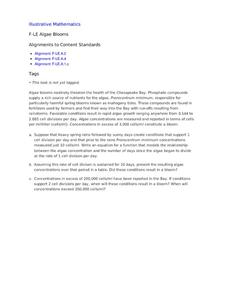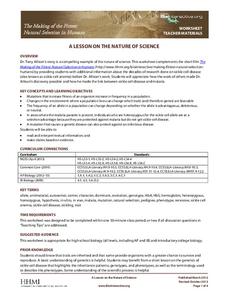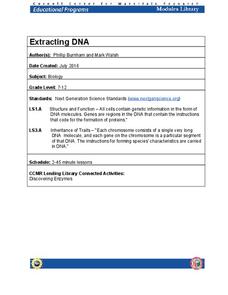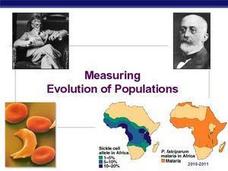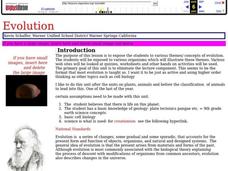Curated OER
Science Spelling
For this biology worksheet, students identify and locate various vocabulary terms related to cells and parts of the body. There are 20 biology terms located in the word search.
Curated OER
Protists - The Protozoans
Five pages provide thorough coverage of three protozoans: euglena, amoebae, and paramecia. For each, junior biologists read factual text, label the organism, and write answers to several questions. This neatly organized assignment is...
Curated OER
Neurons and the Nervous System
The highlight of this series is activitiy #4. Anatomy pupils examine slides of three unknown cells. With the function of the nervous system in mind, they consider the structure of each and try to guess which one is part of that system....
NBC
Nutrition, Hydration, and Health
NFL football in science class? Yes, please! In an engaging and motivating three-day lesson, kids take a look at their own nutritional habits and needs compared to those of an NFL player, then experiment with the effects of hydration on...
Curated OER
Lesson: Communication, What's Valued, and the Written Word
Upper graders compare their cell phones to a lacquer box from the Japanese Edo Period. They consider how each is a form of communication and how the very nature of each object communicates social norms, ideology, and beliefs. A...
Baylor College
Neurotransmitters Contain Chemicals
Human body systems students play a card game, "Locks & Keys" in order to learn that neurotransmitters carry a message from one neuron to another by fitting into a receptor site on the receiving nerve cell. While this activity can...
Global Oneness Project
The Value of Ancient Traditions
Imagine having to give up cell phones, computers, and TV? What would be lost? What gained? An examination of the Drokpa, a nomadic people who live in the grasslands of Tibet, provides class members an opportunity to consider how access...
Science 4 Inquiry
Do You See What I See?
In only nine months, a small group of cells grows into a fully developed baby. Pupils learn about the development of an embryo to a fetus to a baby. They identify each step of weekly development. Young scientists look at ultrasounds to...
Curated OER
Algae Blooms
Your microbiologists explore a changing algae population and build an exponential function modeling algae concentration from the description given of the relationship between concentrations in cells/ml and days of rapid growth.
Teach Engineering
Edible Algae Models
Sometimes it's okay to eat your science experiment. A hands-on activity has pupils create models for algae to learn about its cellular structure. The best part of the experiment? The resulting juice-filled gels are edible—yum!
Curated OER
Neuron Cookie
Find out just how enticing learning about neurons can be by creating models with sugar cookies, icing, and candy. With great background information for you and an easy procedure for the kids, studying cells has never been more fun or...
Howard Hughes Medical Institute
A Lesson on the Nature of Science
If you are looking for a great way to present natural selection in humans, look no further. This handout is intended to accompany the 14-minute video The Making of the Fittest: Natural Selection in Humans, which can be found on the...
Curated OER
Teaching Biology Through Bioinformatics
Wow! A very detailed slideshow covers complex topics of genome research methods. This is advanced and relevant to the highest level of school biology. Excellent resource if you wish to expose your class to scientific methods and...
National Institute of Open Schooling
Electrochemistry
In an electrolytic cell, electrical energy is converted into chemical energy, the exact opposite of a battery! Lesson 15 in a series of 36 explores electrochemistry. Participants begin by reading and discussing oxidation/reduction...
Cornell University
Extracting DNA
Uncover the basics of DNA structure through exploration activities. Collaborative groups build DNA models and recreate the process of replication. Then, using plant cells such as peas or strawberries, they extract a DNA sample.
The New York Times
Sequencing the Stages: Understanding H.I.V. Infection at the Molecular Level
How does HIV operate at the molecular level? Pupils discover the progression from a healthy immune cell to one infected with HIV, watch an animation of the HIV life cycle, and finally identify each of the stages with illustrations...
Curated OER
Measuring Evolution of Populations
The Hardy-Weinberg principle is the focus of this concise slideshow. Some vocabulary definitions are given on the first 2 slides, and the rest are given over to examples of the Hardy-Weinberg theorem. Calculations of the H-W...
Curated OER
Cellular Respiration: Other Metabolites and Control of Respiration
The feedback mechanisms of metabolism of a variety of substances in the human body. Carbohydrates, lipids, amino acids, and their derivatives are explained. The biochemistry required to explain the metabolic balance and feedback controls...
Curated OER
Evolution
Explore the concept of evolution and cell biology; your class can work in groups to use the internet to view websites on evolution, take a quiz, and complete a lab activity.
National Institute of Open Schooling
Solid State
Crystal comes from a Greek word meaning ice. Activity eight in a series of 36 has class members analyzing amorphous and crystalline solids and further classifying them based on their forces. They then explore solids, learning about unit...
Curated OER
The Sorcerer's Apprentice: 200 Greatest Pop Culture Icons
Upper graders view the animated short, "The Sorcerer's Apprentice" and analyze how the music score was chosen to express the scene. They create an animation as they listen to a classical recording to experience the connection between...
Curated OER
Particles: Size Makes All the Difference
High schoolers plot particle sizes of common airborne materials on a log scale. They read an article on particle size and its relationship to the ability to pass through the lungs, into the bloodstream, and eventually into the cells...
Serendip
DNA Structure, Function and Replication
Before a cell replicates, its DNA must replicate. Take advantage of a hands-on guided lesson to teach budding scientists how this happens. Using a set of nucleotide cards, learners become the DNA and work to create matching strands...
Serendip
Mitosis and Meiosis Card Sort
Cells divide by one of two processes, either mitosis or meiosis. Scholars sort cards into two sets, one representing each type of cell division. Then, they sequence the cards demonstrating an understanding of the movement of chromosomes.
Other popular searches
- Animal Cells
- Plant and Animal Cells
- Plant Cells
- Stem Cells
- Eukaryotic Cells
- Blood Cells
- Cells Crossword
- Cells and Organelles
- Cheek Cells
- Life Science on Cells
- Microscope Cheek Cells
- 3d Animal Cell








